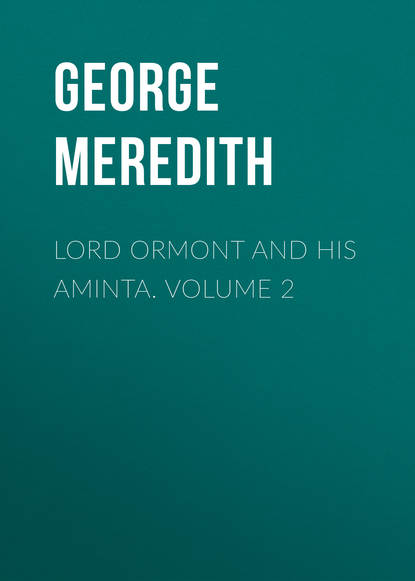По всем вопросам обращайтесь на: info@litportal.ru
(©) 2003-2024.
✖
Lord Ormont and His Aminta. Volume 2
Настройки чтения
Размер шрифта
Высота строк
Поля
Aminta reviewed perforce, dead against her will, certain of the near-to- happiness ratings over-night. She thinned her lips, and her cheeks glowed. An arm, on the plea of rescuing, had been round her. The choice now offered her was, to yield to softness or to think. She took the latter step, the single step of an unaccustomed foot, which women educated simply to feet, will, upon extreme impulsion, take; and it held a candle in a windy darkness. She saw no Justice there. The sensational immensity touched sublime, short of that spirit of Justice required for the true sublime. And void of Justice; what a sunless place is any realm! Infants, the male and the female alike, first begin to know they feel when it is refused them. When they know they feel, they have begun to reflect. The void of Justice is a godless region. Women, to whom the solitary thought has come as a blown candle, illumining the fringes of their storm, ask themselves whether they are God's creatures or man's. The question deals a sword-stroke of division between them and their human masters. Young women, animated by the passions their feeling bosoms of necessity breed, and under terror discover, do not distinguish an abstract justice from a concrete. They are of the tribe too long hereditarily enslaved to conceive an abstract. So it is with them, that their God is the God of the slave, as it is with all but the bravest of boys. He is a Thing to cry to, a Punisher, not much of a Supporter—the Biblical Hebrew's right reading of Nature, favouring man, yet prompt to confound him, and with woman for the instrument of vengeance. By such a maze the blindfolded, are brought round to see Justice on earth. If women can only believe in some soul of justice, they will feel they belong to God—of the two; and the peril for them then is, that they will set the one incomprehensible Power in opposition to the other, urging them unsatisfied natures to make secret appeal away from man and his laws altogether, at the cost of losing clear sight of the God who shines in thought. It is a manner whereby the desperately harried among these creatures of the petted heart arrive upon occasion at an agreeable, almost reposeful, contemplation of the reverse of God.
There is little pleasure to be on the lecture-rostrum for a narrator sensible to the pulses of his audience. Justice compels at times. In truth, there are times when the foggy obscurities of the preacher are by comparison broad daylight beside the whirling loose tissues of a woman unexplained. Aminta was one born to prize rectitude, to walk on the traced line uprightly; and while the dark rose overflowed the soft brown of her cheeks, under musings upon her unlicenced heart's doings overnight, she not only pleaded for woeful creatures of her sex burdened as she and erring, she weighed them in the scales with men, and put her heart where Justice pointed, sending men to kick aloft.
Her husband, the man-riddle: she was unable to rede or read him. Her will could not turn him; nor her tongue combat; nor was it granted her to pique the mailed veteran. Every poor innocent little bit of an art had been exhausted. Her title was Lady Ormont her condition actually slave. A luxuriously established slave, consorting with a singularly enfranchised set,—as, for instance, Mrs. Lawrence Finchley and Lord Adderwood; Sir John Randeller and Lady Staines; Mrs. May, Amy May, notorious wife of a fighting captain, the loneliest of blondes; and other ladies, other gentlemen, Mr. Morsfield in the list, paired or not yet paired: gossip raged. Aminta was of a disposition too generously cordial to let her be the rigorous critic of people with whom she was in touch. But her mind knew relief when she recollected that her humble little school-mate, Selina Collect, who had suffered on her behalf in old days, was coming up to her from the Suffolk coast on a visit for a week. However much a slave and an unloved woman, she could be a constant and protecting friend. Besides, Lord Ormont was gracious to little Selina. She thought of his remarks about the modest-minded girl after first seeing her. From that she struck upon a notion of reserves of humaneness being in him, if she might find the path to them: and thence, fortified by the repose her picture of little Selina's merit had bestowed, she sprang to the idea of valiancy, that she would woo him to listen to her, without inflicting a scene. He had been a listening lover, seeming lover, once, later than the Granada sunsets. The letter in her jewel-box urged Aminta to clear her conscience by some means, for leaving it unburnt.











